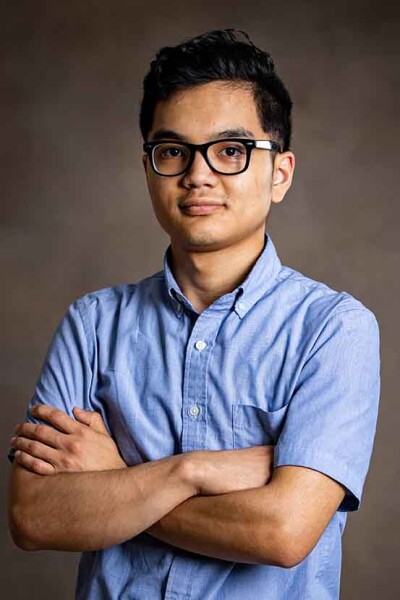Internship reinforced passion for medicinal chemistry
Internship reinforced passion for medicinal chemistry
NAME: Tsering Tashi
CLASS YEAR: 2023
HOMETOWN: Bylakupee, India
MAJOR: Neuroscience
CAMPUS INVOLVEMENT: Asian Student Association, International Club, Beta Beta Beta, Nu Rho Psi, Phi Eta Sigma, Computer Science Club, Google Developer Student Club
WHY DID YOU CHOOSE WARTBURG: I chose Wartburg because of the small community and the liberal arts environment. I am an aspiring polymath (a person with wide-ranging knowledge). I didn’t want to focus on just one discipline but many, and some of the most life-changing things I’ve learned at Wartburg were outside of my field.
LIKE WHAT: I took an Islam class with Dr. (Kuni) Terasawa. I had so many doubts about Islam, so many misconceptions. The class cleared up those misconceptions, and I learned about Islamic tradition and culture so now I can relate to some of my friends better. I started going to the gym as a result of taking PE. That’s the thing about liberal arts, you never know what you will get out of the classes you take.
HOW DID YOU CHOOSE YOUR MAJOR: In 10th grade I went to a conference that was a dialogue between Buddhist scientists — I’m a Buddhist — and Western scientists. I was intrigued by the cognitive psychology but also inclined toward the biology side of neuroscience. I also like that neuroscience is an interdisciplinary field. I wanted to find a way to combine Buddhism with the modern neuroscience I learned here. Now, I’m more interested in medicinal chemistry, but I still like the idea of overlapping Tibetan medicine and Western medicine.

WHAT ARE YOUR PLANS AFTER GRADUATION: I’m headed to the University of Illinois Chicago for the pharmaceutical sciences Ph.D. program. I decided to do medicinal chemistry because of Neurobiology of Disease. In that class I learned about pathological proteins in diseases like Alzheimer’s and Parkinson’s and it made me more curious about therapeutic interventions.
HOW HAVE YOU PREPARED FOR THE NEXT STEP: Last summer, I had an internship at Mayo Clinic doing research in epigenomics (a field in which researchers study modification of the fixed human genome and how it impacts us on the outside) as it relates to chemotherapy resistance in ovarian cancer. The chemotherapy will work, but after about two years patients develop a resistance. We were looking at the stem cell hypothesis which basically says that the drugs are not working because the cells keep regenerating and are able to survive even if you treat them with drugs. I was in a dry lab, not in the lab working with cells, but on the computer working with data. I have a minor in computer science, so I have that data science background that was important for this research. This was all a great experience because computational chemistry is important. It’s important to be a holistic researcher. You can’t just graduate with wet lab skills; these dry lab skills will help me become more independent as a researcher because I won’t have to rely on others to analyze and interpret the data.
DO YOU STILL SEE YOURSELF WORKING WITH BOTH BUDDHIST AND WESTERN MEDICINE: Yes. Tibetan medicine is very holistic; if you take it, there are no side effects. Western medicine focuses on just one area of the body, which can cause problems in other areas. I’m very interested in pharmacognosy (natural drugs obtained from organisms like plants, microbes, and animals), so hopefully I can still integrate the two and come up with safer drugs. UIC has a couple labs that focus on Chinese natural products, which is similar to that of the Tibetan.
WHAT KIND OF MEDICINE DO YOU WANT TO SPECIALIZE IN: Right now, I’m leaning toward neurological disorders because of my background in neuroscience, but over time that might change. My future goal is to open my own pharma start-up, and to do that I may need to branch out.
AS YOU FINISH YOUR SENIOR YEAR, WHAT HAS BEEN YOUR FAVORITE WARTBURG MEMORY: Outfly. Last year I had an organic chemistry test that was postponed because of it so I had a little extra time to study. Late Knight Breakfast is great too, seeing all the faculty and staff come together to serve us before finals.
WHAT WAS YOUR FAVORITE CLASS: Neurobiology. We go deep into how movement works, how emotion works, learning, and memory. It’s a very in-depth lecture class.
AND THE HARDEST: Immunology. The field itself is next level. Organic chemistry and biochem were hard in the beginning, but they grew on me. Maybe because I’m taking this class in May Term, it hasn’t had the chance to grow on my yet, but right now, it’s just a lot.
WHAT DO YOU THINK PEOPLE MAY NOT KNOW ABOUT WARTBURG: The international student presence is strong, and the community is very tight. I talk to international students from other schools, and they always say how tight knit our group here is. I have good friends from all over on campus. The international student at Wartburg do amazing things and contribute to the vigorousity of the campus. For example, we always have students who receive Davis Projects for Peace grants to fund a project somewhere around the world. We care about the community here.
This year the Mensa (dining hall) has been great. The chef (Jami Dare) knows I’m a vegetarian, and she’s always asking me how I liked my meal and making an effort to cook foods that we will enjoy. Raine (Terrill, senior manager in Mensa) introduced an international condiment station. It’s great and makes me feel like I am at home. It’s great progress in that area.